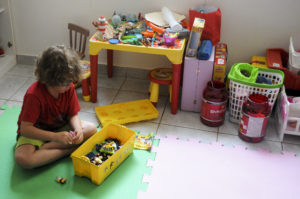Raising a child is a great responsibility in our lives. Not only because we are preparing another life for the world, but because we are responsible for being part of the future, defining what that child will become and, even unconsciously, leaving part of ourselves for future generations. This responsibility increases significantly when we talk about raising special children. Children with some type of need who require greater attention are a challenge for parents. Most people do not know how to properly handle this type of situation and learn throughout life how to do it. But the important thing is, above all, to improve yourself so that your child is capable, no matter what their special need may be.
What Are Special Children?
When we talk about special children, we soon realize that it is a very broad term. Normally, when this term is used, it refers to children who have certain needs, such as blind children, deaf, paraplegic, autistic, children with intellectual disability or mental disability as well. Considering all children who have these problems as a single group has its positive and negative sides. The positive side is that when we talk about the rights and needs of special children, we are talking about rights that make all children equal in the eyes of society, regardless of their physical, intellectual, or mental condition. On the other hand, the negative side happens precisely because of a certain prejudice that many people still have and that ends up preventing them from seeing the particularities that each type of disability has. Although these two sides exist, it is necessary to understand that they do, and from this understanding, to think of solutions to create a better world for all special children.
The Achievements of Special Children
If we do a brief historical review of the inclusion of people with disabilities in Brazil, we will realize that the achievements are relatively recent but extremely important for the entire community of people who have any type of disability in Brazil. For many centuries, and more precisely until near the end of the last century, people with disabilities were seen as inferior and useless to society. This feeling stemmed from a great deal of prejudice that still needs to be tackled today. The situation began to change starting in the 1990s, when various groups formed by people with disabilities began to demand their rights and encourage the creation of laws requiring different sectors of society to adapt to the needs of each group. It is thanks to these achievements that nowadays special children have a much better outlook for the future than special children born 30 or 40 years ago. Of course there is still much to be achieved, but it cannot be denied that there has been some progress in this regard. 
Inclusion in Schools
Including various special children in school is a process that requires special attention from the teacher, but always closely accompanied by the parents. It is important to remember that accepting the child’s condition, as well as making them feel comfortable with their condition, begins at home. A child who is at peace with their difficulties within the family environment will have much more moral support and higher self-esteem to deal with the challenges of adapting to a school. When we talk about inclusive education, we are referring to a process that aims to include practically all types of children in regular schools, that is, a type of education that seeks to end the segregation of education between children with and without disabilities. Law number 9,394/96 is a major milestone for inclusive education and a great achievement for special children, as it is the law that allows this type of education to be carried out throughout the national territory. Inclusive education has several benefits, the main one being the integration of children with disabilities into social life with all types of children. This is extremely important so that children do not grow up with prejudice and also so that special children have the same level of education and opportunities as other children. These are benefits that may seem small, but change the way people see the world. Little by little, these achievements make society increasingly more equal.
Dealing with Prejudices
Despite the many advances in recent years, prejudices will not disappear overnight. This means that, inevitably and unfortunately, a special child will have to deal with some sort of prejudice during their life. The role of parents here is extremely important so that these moments do not negatively affect the child to the point of harming their well-being or impacting their development in some way. It is important to show the positive side, point out all the children and friends who are not prejudiced and also explain the history and achievements of special children over recent years. If prejudice happens at school, parents should talk to the teacher, principal, or coordinator so that something is done about it. Special children can live a normal life. It is important to affirm and recognize this as truth so that we understand that many of the ideas passed down to us for decades are outdated and do not reflect the reality of the community of people with disabilities. It is necessary to learn to live with differences and, for this reason, both parents of special children and parents of children without any disability should teach and especially demonstrate to their children that everyone has differences, but everyone also has rights, duties, and dignity. We will not build a better and prejudice-free society overnight, but certainly raising a child with this awareness is already a great achievement. Also read: Childhood Autism – Living Inside Their Own World Photo: Federal Senate











